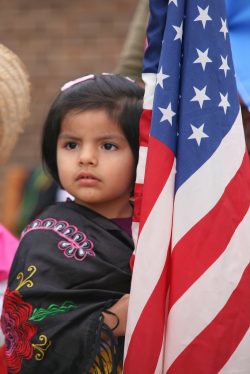
We’re watching closely the decisions being made in Washington, D.C. that could result in an inaccurate U.S. Census in 2020. We have serious concerns about several proposed changes, including one that would add a citizenship question to the Census. Arkansas depends on an accurate count for everything from highway funding to grants for water projects and early education programs. Our concern is that, if families are confused or concerned about answering any of the questions, we might not get an accurate count in Arkansas and across the nation.
Today, we urged the U.S. Department of Commerce to leave off the citizenship question. If you’d like to submit your own comment, you can do so here. The deadline is today at 10:59 p.m.
Here is AACF’s full public comment:
“Arkansas Advocates for Children and Families is a 40-year-old children’s advocacy organization based in Little Rock, Arkansas. Our mission is to ensure that all children and families have the resources and opportunities to lead healthy lives and reach their full potential. We do that by researching the needs and challenges of children and then using that information to propose policy changes to address those needs. That can include changes to education law, child welfare and juvenile justice law, or health care policy, among other areas.
We are experts in the challenges faced particularly by children in poverty, and the policy solutions that can address those challenges here in Arkansas.
One linchpin in our work is accurate data on children and families. We depend on the Census to be accurate to help inform the types of policy solutions that are necessary to do our work. For example, we rely on the Census to know information as basic as where children in poverty live in Arkansas. We use that information to urge public investment in everything from the Children’s Health Insurance Program (CHIP) to summer learning programs to early childhood educational opportunities.
Because we know how important this information is to children and families in our state, we strongly urge the Commerce Department to remove the citizenship question from the 2020 Census form. Including an untested, controversial question will undermine the quality and accuracy of the Census. The Census Bureau’s own chief scientist warned of lower response, higher costs, and a less accurate census if the citizenship question is included. We are concerned that this question will make it even harder to get a full count of young children. The 2010 Census had a net undercount of 1 million children, and this question threatens to make that undercount worse in 2020. One in four young children live in households with at least one immigrant family member.
In Arkansas, more than 80,000 children live in households with at least one immigrant family member. If their parents are confused about or reluctant to respond to the Census, we will have an inaccurate count and will have thrown away public money on a Census that does not meet scientifically sound standards.
Including a citizenship question puts the Census at grave risk of a significant undercount, especially young children, a population that has historically been undercounted, and among hard-to-reach population groups that already are fearful of answering government surveys, according to the bureau’s own research. Undercounts have serious consequences, including affecting the allocation of more than $800 billion in federal funds allocated to states and localities based on census data. Programs serving children that might be affected include the Child Care and Development Block Grant (CCDBG); Head Start; Title 1 grants to local education agencies; Special Education Grants (IDEA); the Children’s Health Insurance Program (CHIP); the Women, Infants, and Children (WIC) Special Supplemental Nutrition Program; and Foster Care.
This decision is bad for the Census, bad for our communities, and we strongly urge the Commerce Department to remove the question.
In addition, we request that the Census Bureau revamp its communications research and outreach to include special attention to the undercount of young children. Their futures depend on us getting this right.”
